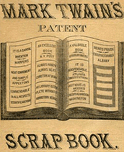


|
Personal Peculiarities of a Well Known Author [From Our Special Correspondent.] New York, May 5, 1885. . . . Speaking of authors, Mr. George W. Cable does not enjoy a high degree of personal popularity in our literary circles at present. He has revealed a smallness which it is hard to reconcile with his writings. Many stories of are floating around. He fell sick at Hartford, was taken to Mr. Coleman's [i.e. Clemens'] house and nursed for a long time. This was all right. For nearly three weeks he almost lived on champagne, ordered expressly for him. Doubtless that was all right, too--at least Cable seemed to think so. During his illness there had been considerable telegraphing, and after his recovery Cable did have the grace to ask if there were not some telegraph bills for him to pay. Well, Clemens, of course, had paid for the dispatches as they arrived, but he had kept a list, which he showed Cable. The total was some $10. Cable gravely sat down to audit his friend's account. Presently he came to one telegram which was unimportant, but which Clemens had received and paid for. "That should not have been received," said Cable, and promptly crossed it off the list, leaving his friend so much out of pocket. It was only a trifle, but characteristic, especially when you think of the champagne and nursing. Well, after all this attention in Hartford, it happened that a local church needed to raise money for a charitable purpose. The patrons of the plan were friends of Clemens and people who had been good to Cable, and they ventured to ask the latter if he would read one or two selections in aid of the charity. Mr. Cable replied that he thought they could better afford to pay him for reading than he could to give them a reading free. Under the circumstances, it is not strange that Clemens and his friends at this curt answer. Rumor has it that Clemens did not thoroughly enjoy his reading tour with Cable on account of the latter's parsimony. They say that Cable did not spend the price of a postage stamp during the trip. The agreement was that his expenses should be paid, and he quickly adopted the habit of ordering the most expensive things at hotels, and of leaving Clemens to pay even the horse car fares when they were out together. Clemens, whatever faults he may have, is not a small man, but I understand that he became soured by seeing Cable order $5 breakfasts and other things in the same style, knowing that Cable ordinarily lives in the most frugal and economical way. It is reported that Cable was paid $500 a week over his expenses by Clemens, who took the balance of the receipts. For the 16 weeks, this would give Cable $8000, out of which he probably had to pay a commission to his manager. But he must have "salted down" a very tidy sum, enough to enable him to spend a penny now and then. I understand that Cable refused to join in the authors' readings last week, in precisely the same way that he refused to aid the Hartford philanthropists. Much surprise was expressed at his non-appearance. But he considered, I suppose, that the lack of a copyright law would not harm the sale of his books, and he didn't propose to aid his guild without cash down for his services. Queer that the author of "Grandissimes" and the delineator of generosity and unselfishness in "Dr. Sevier" should display in his private life. But it is a dangerous thing to confound the man with the author. Queer that a man, who is a fanatic on the subject of keeping the Sabbath, should put so narrow a construction on his duties to his fellow-man. Once Mr. Cable left Boston on a Saturday night. His friends were expecting him at Hartford. But reaching Worcester about midnight, he persisted in leaving the train, going to a hotel and staying there until midnight Sunday, when he resumed his journey. He had no thought for the annoyance which he might cause his friends. His fetich was Sabbath keeping, and he was blind to everything else. It was the same way in his reading tour. It made no difference how much trouble was caused to others or how many audiences were disappointed. He would not travel on Sunday, although he was forced to make some fine distinctions. Somebody asked him how he reconciled it to his sensitive conscience to write novels, but he declined to argue on the subject. Like the actor, there is a great difference in the author before and behind the scenes. The fact is that Cable was brought up in poverty. He had a hard, grinding life. He has known the bitterness of being very poor, and he remembers it like a nightmare. He has resolved to render his future secure, and, with this in view, he is making hay with all his might and main while the sun of prosperity shines upon him. If he is unwilling to help others, it is true that he spends little or no money upon himself. He will never drain the cup of poverty again if he can help himself. With all his literary talent and scrupulous honesty in business dealing, it is a pity that he should so conduct himself as to be accounted even by his friends. Some of his southern critics would say that he simply proves himself again a Yankee with no affiliation to the South. By the way, I hear he has answered Mr. Henry W. Grady in an article which is pronounced a masterpiece. . . . |
| SOURCE: Arlin Turner, "Mark Twain,
Cable, and 'a Professional Newspaper Liar," New England
Quarterly 28 (March 1955). |
 |
 |
 |